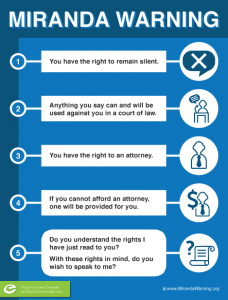What to do if arrested in Ocean County NJ
You must be informed of your rights in your language

If you or someone you know does not speak English, New Jersey law guarantees your right to be informed of your rights and Miranda Rights in your language. In New Jersey, if you do not understand English the law allows for you to be informed in a language that you understand, because to the contrary is the same as not being informed at all. Nearly a third of New Jersey residents now speak a language other than English at home and the population of people who were born outside the U.S. continues to grow, new Census data shows.
Be aware that if you claim not to speak or understand English, you may have to prove this in court. So, don’t pretend not to understand. If the court thinks that you are holding back or intentionally wasting the court’s time and resources, it will almost for sure backfire. Don’t go there.
Under the U.S. and New Jersey Constitutions, before you can be questioned, you must be informed that you have the right to remain silent with a warning that any statement you do make may be used as evidence against you. Furthermore, every person has the right to an attorney. You can retain your own attorney or one will be appointed for you by the court. It is smart to be prepared: know your rights.
Allow a qualified criminal defense attorney at Bronzino Law Firm to evaluate your case and explore all possible defenses under the rules of the law. Contact us online or by telephone at 732-812-3102 for an initial confidential consultation.
Your Miranda Rights in a Monmouth County Arrest

Miranda Rights are meant to protect you against coerced confessions and the infringement upon a your Fifth, Sixth and Fourteenth Amendment Rights. Miranda has an intended secondary affect, as well. It keeps our law enforcement transparently honest while reinforcing equal protection and due process.
However, Miranda only applies under specific conditions: The person arrested must be in police custody and under interrogation.
Sometimes people think that if the police didn’t read Miranda Rights at the arrest scene, then the arrest is somehow illegal or invalid. Don’t make this mistake if you are arrested or detained. Miranda rights are only relevant in the context of custodial interrogations or consent requests when a person is in custody.
What to say to a Brick or Toms River Police Officer if you are arrested?”
The best response is not what you see in most movies. The answer to the question above is to say nothing or say very little while remaining respectful, using appropriate language, and being compliant without compromising your rights.
For most people, being confronted by a law enforcement officer is not an everyday occurrence and can be very frightening. Frequently, people are not sure how to respond during such an encounter. A typical reaction can range from fear which inspires a flee response, to one of over-compliance where a person will talk too much in an effort to be collaborative.
Obey, but also know your rights during a traffic stop or being detained Ocean and Monmouth Counties
For the most part, we know that everyone must obey an officer, but we also know that we have constitutional rights. Be prepared by having a clear idea about what your rights are. The stress of a police encounter leads many people to simply capitulate to whatever the officer wants. Be firm and respectful, and be prepared for a potentially unhappy officer. Unfortunately, there are officers who tend to get so accustomed to complete and automatic compliance that they react angrily when people surprise them invoking their rights.
Pay attention and listen carefully to what the officer is requesting or asking
Usually, a police officer will identify him-/herself, but not always. The smart response during any encounter with police or law enforcement is to obey the commands and be respectful. In addition, you do have the option to politely and calmly decline requests.
Listen carefully to what and how they ask you something. For example, they may knock on your door and say, “Let’s talk” or “Do you mind if I have a look around?”
In such cases, you can and should request clarification by asking, “Are you ordering me to open my door and allow a search? Or, “Do you have a search warrant?”
If it isn’t an order, then you have a choice about how to respond. While a person must always truthfully identify themselves to a law enforcement officer, it is YOUR CHOICE to freely give, or to decline, answers to all questions or to give permission to search your property without a warrant. If there is no search warrant, you cannot be arrested for refusing to consent to a search.
Responding to a search warrant in Howell, NJ
There are a series of steps that police or other law enforcement offers must follow when executing a search warrant:
• Police must knock and announce their presence before entering the premises. The exception is a “no knock” warrant which would have required good cause.
• After announcing, police may then enter the premises and locate the appropriate individuals according to the search warrant.
• Upon identifying the individuals, the police should advise those individuals of the specifics of the search warrant and provide them with a copy of it.
• Miranda warnings should be read to these individuals before any questioning occurs.
• Then the police can proceed with the search as defined in the warrant.
• An inventory of any and all evidence taken during the search must be prepared by the officers.

What’s the best response if you are detained?
• Remain calm. Don’t run. Speak carefully and respectfully. You must identify yourself, after that politely clarify if what is being requested of you is an order or your choice. Anything you say can be used against you.
• Don’t touch officers. Keep your hands in view.
• Don’t resist, even if you’re innocent or if you think the police or ICE are acting unfairly or unlawfully.
• You have the right to say no to searches of your car, house or person. You cannot be arrested for refusing to consent to a search without a warrant.
• If you’re stopped by police or ICE, ask them “Am I free to leave?” If you are and do not wish to talk, calmly walk away.
• You do not have to speak to the police or ICE; however, legal immigrants or visitors must show proof of that legal status to ICE agents if asked, but not to police officers.
• If you are arrested:
o Ask for a lawyer. Call us at 732-812-3102
o Tell authorities you’re going to remain silent.
o Say nothing.
Bronzino Law Firm will protect your rights across Monmouth and Ocean Counties
For additional information and the answers to your pressing questions, contact the Bronzio Law Firm, LLC, serving Ocean and Monmouth counties. Call 732-812-3102 to schedule a free initial consultation with an attorney to retain the experienced representation that you need.
Crossing paths with police can be alarming even when you’ve done nothing wrong. If you have been arrested or taken into custody, having a skilled and experienced divorce attorney on your side will help you to make informed, confident decisions that best serve your interests. Contact the Ocean County law offices of Bronzino Law Firm LLC today to understand your available options. One of our reputable New Jersey divorce attorneys will answer your questions and provide you with a cost-free initial consultation. 732-812-3102







